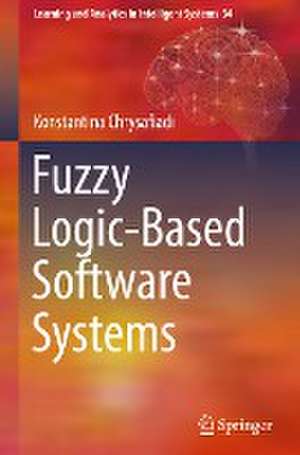Fuzzy Logic-Based Software Systems: Learning and Analytics in Intelligent Systems, cartea 34
Autor Konstantina Chrysafiadien Limba Engleză Hardback – 16 oct 2023
Din seria Learning and Analytics in Intelligent Systems
- 20%
 Preț: 1446.19 lei
Preț: 1446.19 lei - 18%
 Preț: 1233.83 lei
Preț: 1233.83 lei - 18%
 Preț: 1241.73 lei
Preț: 1241.73 lei - 20%
 Preț: 994.08 lei
Preț: 994.08 lei - 20%
 Preț: 1276.21 lei
Preț: 1276.21 lei - 20%
 Preț: 658.98 lei
Preț: 658.98 lei - 20%
 Preț: 1270.62 lei
Preț: 1270.62 lei - 5%
 Preț: 1592.38 lei
Preț: 1592.38 lei - 20%
 Preț: 1312.52 lei
Preț: 1312.52 lei - 20%
 Preț: 993.42 lei
Preț: 993.42 lei - 15%
 Preț: 648.74 lei
Preț: 648.74 lei - 18%
 Preț: 1227.21 lei
Preț: 1227.21 lei - 20%
 Preț: 979.24 lei
Preț: 979.24 lei - 20%
 Preț: 994.26 lei
Preț: 994.26 lei - 20%
 Preț: 925.95 lei
Preț: 925.95 lei - 18%
 Preț: 1241.42 lei
Preț: 1241.42 lei - 20%
 Preț: 1285.64 lei
Preț: 1285.64 lei - 20%
 Preț: 1281.02 lei
Preț: 1281.02 lei - 20%
 Preț: 1155.61 lei
Preț: 1155.61 lei - 20%
 Preț: 1155.46 lei
Preț: 1155.46 lei - 20%
 Preț: 990.95 lei
Preț: 990.95 lei - 20%
 Preț: 1039.62 lei
Preț: 1039.62 lei - 20%
 Preț: 925.79 lei
Preț: 925.79 lei - 20%
 Preț: 1043.92 lei
Preț: 1043.92 lei - 20%
 Preț: 988.48 lei
Preț: 988.48 lei - 20%
 Preț: 1049.69 lei
Preț: 1049.69 lei
Preț: 820.04 lei
Preț vechi: 1025.05 lei
-20% Nou
Puncte Express: 1230
Preț estimativ în valută:
156.94€ • 163.24$ • 129.56£
156.94€ • 163.24$ • 129.56£
Carte disponibilă
Livrare economică 25 martie-08 aprilie
Preluare comenzi: 021 569.72.76
Specificații
ISBN-13: 9783031444562
ISBN-10: 3031444566
Pagini: 177
Ilustrații: XIV, 177 p. 48 illus., 37 illus. in color.
Dimensiuni: 155 x 235 mm
Greutate: 0.52 kg
Ediția:1st ed. 2023
Editura: Springer International Publishing
Colecția Springer
Seria Learning and Analytics in Intelligent Systems
Locul publicării:Cham, Switzerland
ISBN-10: 3031444566
Pagini: 177
Ilustrații: XIV, 177 p. 48 illus., 37 illus. in color.
Dimensiuni: 155 x 235 mm
Greutate: 0.52 kg
Ediția:1st ed. 2023
Editura: Springer International Publishing
Colecția Springer
Seria Learning and Analytics in Intelligent Systems
Locul publicării:Cham, Switzerland
Cuprins
Chapter 1: Fuzzy Logic.- Chapter 2: The role of Fuzzy Logic in Artificial Intelligence and smart applications.- Chapter 3: Fuzzy-based software systems.- Chapter 4: Comparative discussion.- Chapter 5: Conclusions and Discussion.
Textul de pe ultima copertă
This book aims to provide information about significant advances of Fuzzy Logic in software systems to researchers, scientists, educators, students, software engineers and developers. In particular, this book explains how Fuzzy Logic, can be used in software systems to automatically predict, model, decide, diagnose, recommend etc.. In more details, Fuzzy Logic is an artificial intelligent technique that is ideal for successfully addressing, , the uncertainty, imprecision and vagueness that exist in many diverse scientific and technological areas. It was introduced by Lotfi A. Zadeh of the University of California at Berkeley, as a methodology for computing with words. This ability of Fuzzy Logic allows the representation of imprecise and vague data in a more realistic way. Therefore, Fuzzy Logic-based systems can simulate the human reasoning and decision-making processes, addressing the human subjectivity. Fuzzy Logic-based software systems are referred to any software that concerns anautomated program or process that is used in everyday life, like heating or air-conditioning system, or in the scientific world, like a medical diagnostic system, which uses Fuzzy Logic in order to perform reasoning. A Fuzzy Logic-based system consists of three basic modules: Fuzzifier, Inference Engine and Defuzzifier. The Fuzzifier accepts as input numerical data and assigns them to fuzzy sets with some degree of membership, converting crisp data to fuzzy sets. The Inference Engine applies fuzzy rules over the defined fuzzy sets and produces outputs based on linguistic information. The Defuzzifier, converts fuzzy values into crisp values. The use of Fuzzy Logic in software systems constitutes a compelling and active research area in recent years, especially due to the increased interest in artificial intelligence. In the view of the above, this book presents thoroughly the Fuzzy Logic theory and the structure and operation of a Fuzzy Logic-based system. It also explains the role ofFuzzy Logic in artificial intelligence and smart applications, presenting how it can improve the efficiency and effectiveness of automatic processes and tasks. Furthermore, the book describes techniques of artificial intelligence with which the fuzzy logic is combined and how. Furthermore, this book presents several Fuzzy Logic-based software systems in the discipline of medicine, education, decision making and recommendation, natural language processing, automotive engineering and industry, heating, ventilation and air-conditioning, navigation, scheduling, network traffic and security. Thereby, this book can provide deep insights and valuable information not only to readers of computer science-related disciplines, but also to readers, who come from a variety of disciplines and are interesting in systems that perform tasks related to their discipline, in a more efficient way.
Caracteristici
Explains the role of Fuzzy Logic in Artificial Intelligence and smart applications Presents advances of Fuzzy Logic in Software Systems in a variety of disciplines An aggregated and comparative work concerning the use and incorporation of fuzzy logic in smart software systems
